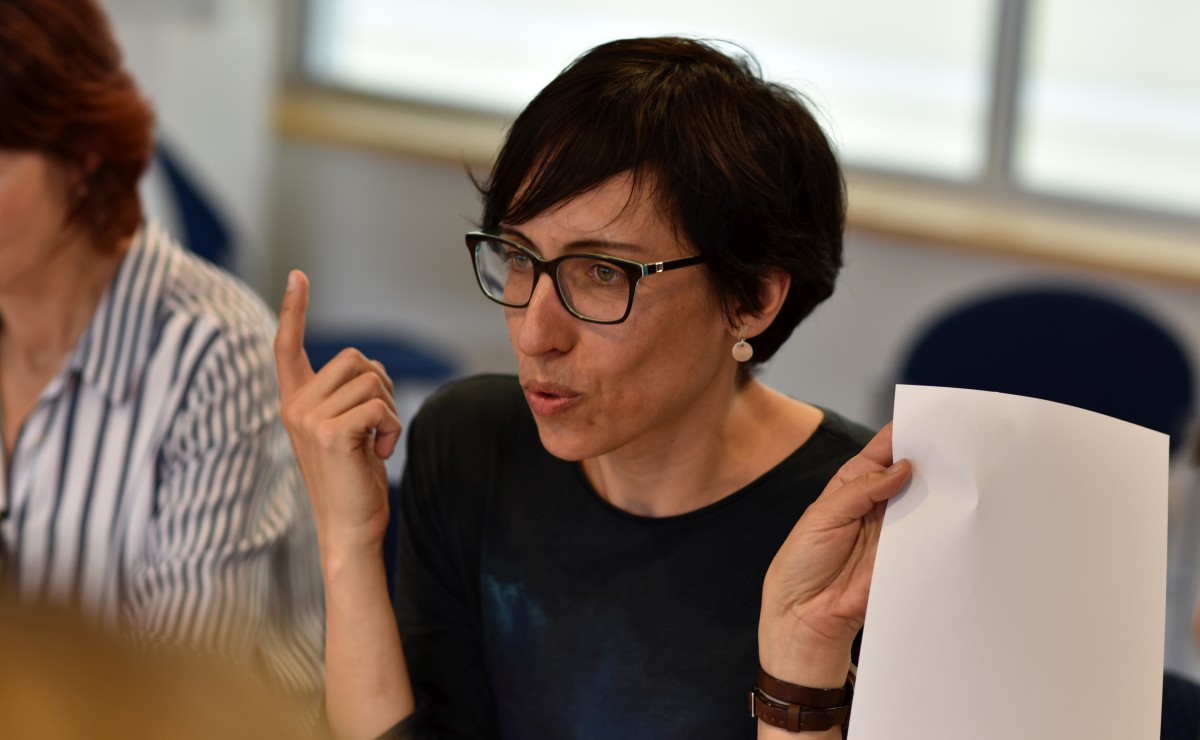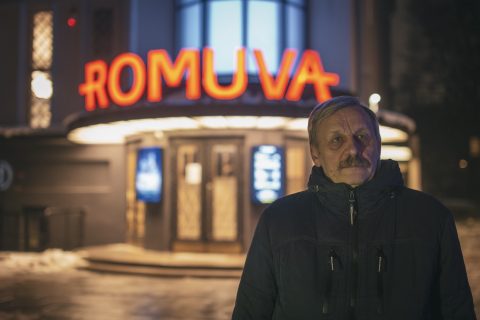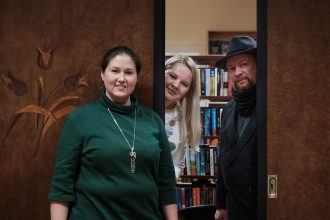One Friday in December, I was standing in the lobby of Romuva, and Sandra Bernotaitė nodded to me when she entered. I remember the pleasant feeling that, well, we’ve been Facebook friends for a long time (who invited who is not clear anymore) and now we are meeting in person. After the screening of Burial, Sandra asked Emilija Škarnulytė all the questions, except one, which was asked by me. I had just finished Sandra’s novel Eyes of the Chimera (Akys chimeros) on the same weekend. The book with a signature and inscription was lent to me by a friend more than a year ago. This means that I will have to return it. I am sorry, Monika, I will not make it until Christmas.
Being pressed by different circumstances, I had to reach out to Sandra and ask her for an interview about community building. But for it to be more authentic, I decided to give into her open invitation to be part of a writing workshop. Let me clarify, writing is a job for me, my hobbies are not related to it, but what would one not do for authenticity. The last Grafolabas of 2022 at the Kaunas Artists’ House was dedicated to foreigners so we communicated and developed various senses in English. I wrote a rather sacred poem! On the way home, we discussed the cold weather, various topics related to the January issue, but our meeting for tea was to take place a couple of days later. We both chose the cinnamon one, which greatly eased the pressure of Christmas decorations in the former kavaledis. We chatted for a couple of hours, starting with mutual acquaintances in Melbourne, Australia, where Sandra, a native of Šiauliai, who studied acting in Vilnius, moved to (but not for those Lithuanians, of course). However, she still became a member of the community. We laughed saying that something does happen to a person, after all, because we all feel that pull towards our compatriots while being far away from the motherland.

It was in the library of the Lithuanian community in Melbourne that Sandra found the testimony of Jonas Aistis about the picnic in the Nemunas in 1939. She came to Kaunas to get a sense of how everything may have looked and smelled – that is how Eyes of the Chimera were born and Sandra became a member of Kaunas cultural field. She conducted writing workshops for communities, raised a “Bibliosaurus” in the library, and interviewed William Kentridge. She also contributed to Kaunas Literature Week. This is what I found most interesting. To be able to create your own works, do it well – even great, I would say –and share it with those who aspire to be like you. However, the most important thing is the concentration of that sharing, the act itself. Sandra is wonderful because she offered to re-answer the questions that were answered in more or less detail in writing and thus saved me a few precious pre-holiday hours, because no one transcribes interviews for pleasure. Next time, the tea is on me.
Can every professional also be a teacher? In other words, what other muscles, besides the literary one, do you have to constantly exercise and grow?
Not everyone can be a teacher, even if they are a great expert in their field. Creativity is one thing, education is another. To educate is to guide another person, to walk beside them, to guide them in the right direction so that they can continue to walk independently and become an expert in the field or even a creator. If you are worried about the growing competition in such a situation, you are not a good teacher. If a person has claims to the status of a creator, exaggerated ambitions, their desire to educate can be narcissistic.
I know of some examples when a teacher becomes a disruptor, the biggest critic and uses that criticism – which they find pleasant – directed at others to justify personal failures, to demonstrate power. It is easier to lecture than to discover something, to create something that does not exist. It is necessary to teach with compassion and empathy, you must stand in the place of the ignorant, remember the times when you yourself did not know something. A great teacher is one who finds joy in the achievements of his students and who helps to achieve that shared joy in a non-violent way. The student is not the creation of the teacher. The teacher just accompanies you for a while and then lets you go.
Why is it beneficial to you to teach others how to write? Is it community building or related to more personal things?
Now I can already say that, without having my own children, I raise other people’s children, I help raise people. But intuitively, I’ve been striving for it since childhood. My first dream was to become a teacher. I also received the greatest gift from my teachers – both living ones and those in books. It is very important to have role models. I was born and raised in a family of uneducated people, so education from the world was everything to me. I have experienced that a person can outgrow the social class they were born into, and this can happen in one lifetime. Where do you go after leaving this stratum? There is a need for a larger community, which is not your biological family. It provides psychological security, heals. A strong sense of community is both social, even political, and at the same time deeply personal. It is important to me that while feeling like members of a group, people would also feel individual, unique, and with opinions that do not and will never coincide. It is the community of writers through literature, which is a constellation of introverts, that allows us to be both together and at the same time apart. We get together for a while, talk about creating, briefly enjoy each other’s company and retreat to be alone. Because there is no other way with writing.
When you stop educating yourself, you stop growing, which is not only mental, but also spiritual stagnation.
How many of your teaching methods were created by others and how many are your own?
I’m just trying to remember where my “writing with senses” or “assisted writing” methods come from. I honestly don’t remember if it was any one exercise or just a tip that I unfolded and continued to develop with all the other practical tools. I know for a fact that the beginning was from other writers, or rather, writing teachers, whose books I read to a great extent, summarizing, and passing on the knowledge on my Grafomanija blog. I organized my first writing workshop seven years ago and since then I have been developing my own method. I am working on it intuitively, trying to adapt to the needs of the participants, which are different every time. Bernotaitė’s methods are as unique as Bernotaitė. Theater, dance, meditation, literature and everything are combined with humor, through play, in search of that “hook of freedom”, which, once unfastened, makes everything easy. When I gather a new group, I come with knowledge and experience, but I am very open – I observe who came, what they need, what they are looking for and what issues they want to address. They don’t know how to start writing and I don’t know how to help them. But when we get to know each other and get moving, we learn everything we need and more.
What do you (secretly) expect from people attending the workshop?
As I sometimes joke, my goal is to make it so that none of the participants would ever visit another writing workshop again, be it mine or someone else’s (although, I do recommend others). I would like people to just go read and write, and attend cultural events in their spare time, become part of the literary field by publishing both their own work and thoughts about other people’s works. Finally, if more people from, say, more “pragmatic” professions would join, maybe we would have more cultural managers, organizers, and initiators and this would enliven the processes.
We really need the ability not only to dream, but also to act. I secretly hope that I will meet people at the writing workshops, with whom I will be able to share readings and thoughts; people who are burning with desire and are able to ignite others, who will become leaders of writing workshops ad increase the demand and success of such sessions. Am I expecting too much? Some of my students are already teaching. I encouraged a dozen people to debut in the press. After people met with me, maybe seven books appeared with my direct or indirect contribution. At the workshop, people get to know each other and continue friendships, for some it’s a great networking activity. According to karma, helping others travels further and it is better for me.

What are the most interesting people you have met at the writing workshop, and do acquaintances develop into more serious friendships?
While visiting Lithuanian cities and towns, I made extraordinary connections in many places. I have friends in Klaipėda, Šiauliai, Anykščiai, Lazdijai, Panevėžys, Vilnius… When we practice writing together, it is an opportunity to share very intimate things, to open up to each other’s sensitivity, and such things are never forgotten and later become more and more important, even if during the workshop we don’t understand it yet. I sometimes meet people in the streets of Kaunas, who look at me and smile, then we greet each other, even though I have no idea how we know each other. We must have met while writing together! Perhaps in the workshop that person wrote about an image that haunted them all their life, which has haunted me too ever since. Maybe I said something brazenly frank to that person that no one has ever told them in their entire life. Maybe I wasn’t praising them for what they wanted but commended them for something unexpected that they hadn’t seen the value of before. In the workshop, I communicate with psychologists, lawyers, chefs, horoscope writers, teachers, tailors, entrepreneurs, and artists of various fields. They may not have studied philology, but they all lived through childhood, which, according to Bernard Shaw, is already one good reason to sit down to write a novel.
You also study. How do you manage to combine teaching and learning?
At the doctoral level, one no longer studies, but works independently, conducts scientific research, and aims not to accumulate knowledge, but to think and understand. As a doctoral student, I am deepening my expertise in my chosen field (in my case, it is the post-war expatriate women’s literature), however, I was expanding my field of perception and knowledge before that as well. I think I can teach others precisely because I am constantly studying. Education helps to raise a question together with a group of people and try to answer it. There is a good saying: if you want to learn something, teach others and you will learn with them. When you stop educating yourself, you stop growing, which is not only mental, but also spiritual stagnation, which leads to neglect and death. Such a person is not beautiful to me. I like lively and beautiful people, so I keep raising the flag, announcing that, “Hey, we are meeting here!”




